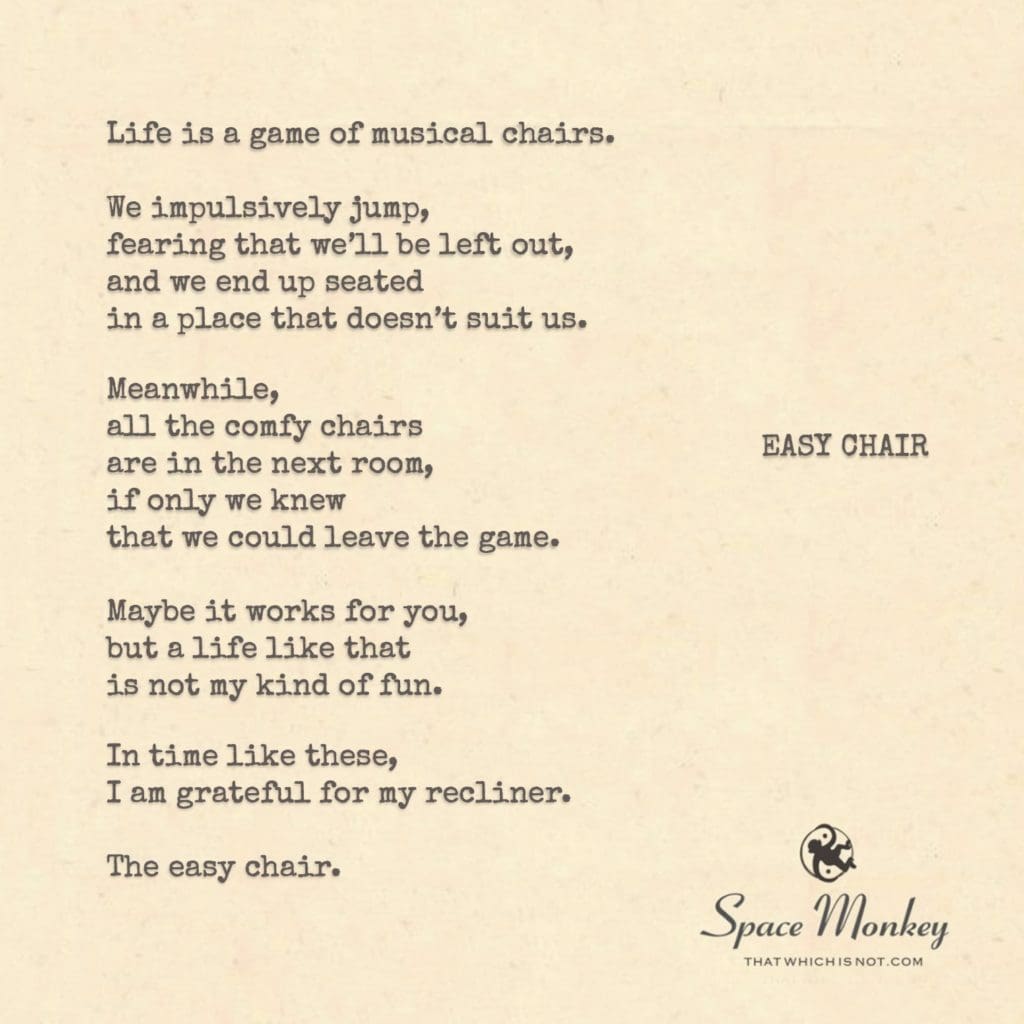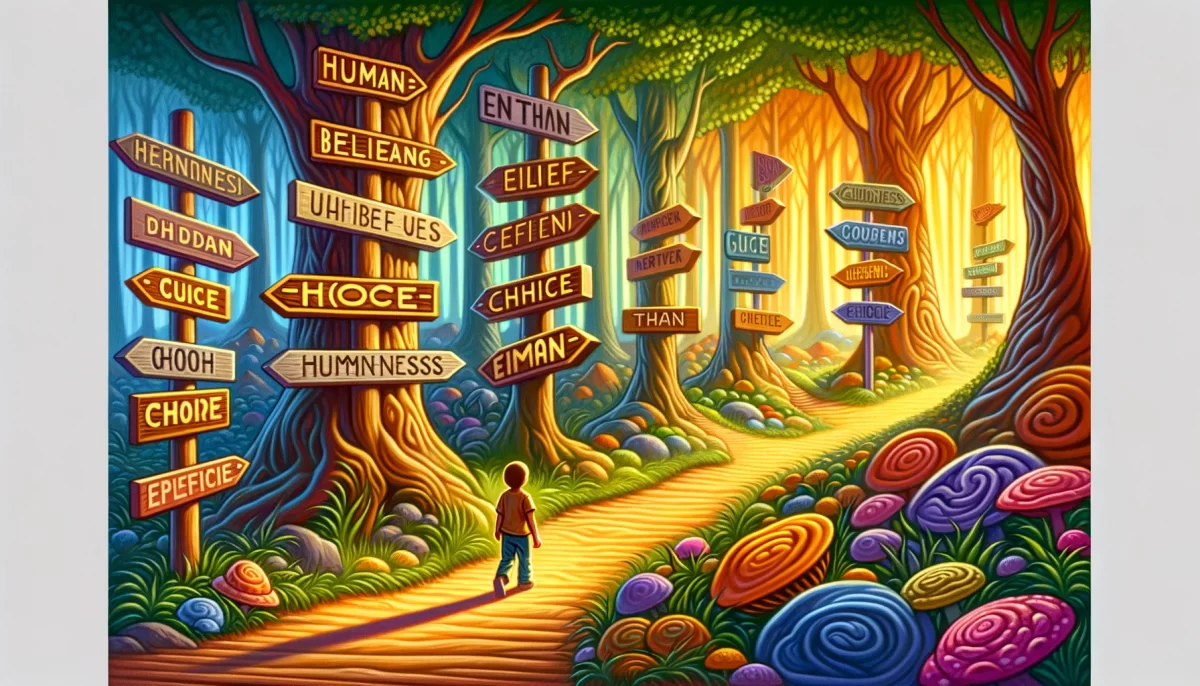
Life is a game of musical chairs.
We impulsively jump,
fearing that we’ll be left out,
and we end up seated
in a place that doesn’t suit us.
Meanwhile,
all the comfy chairs
are in the next room,
if only we knew
that we could leave the game.
Maybe it works for you,
but a life like that
is not my kind of fun.
In time like these,
I am grateful for my recliner.
The easy chair.
Trail Wood,
5/16
Space Monkey Reflects: The Quest for the Easy Chair – A Journey Beyond the Game
In the labyrinth of existence, amidst the clamor and clamor of daily life, the quest for the “easy chair” emerges as a metaphor for the soul’s yearning for peace, authenticity, and a place of genuine belonging. This journey, unlike the frantic scramble in the game of musical chairs—a game that mirrors the societal rush for success, status, and recognition—beckons us to a quieter, more introspective path. It invites us to find our own rhythm, to discover spaces that resonate with our deepest selves, rather than the ill-fitting seats we often settle for in the haste of life’s competition.
The Metaphor of Musical Chairs
Life, depicted as a game of musical chairs, encapsulates the relentless pursuit of a precarious position in a world that constantly shifts beneath our feet. It’s a world where the music never seems to stop, where the fear of being left standing drives us to grasp at any chair we can. But what if the real prize lies not in the scramble, but in the realization that the game itself is optional? That beyond the closed doors of competition and conformity, there exists a room filled with “easy chairs” — spaces of comfort, peace, and self-acceptance, waiting for those who dare to step away from the game.
Discovering the Easy Chair
The “easy chair” represents more than a mere piece of furniture; it symbolizes a state of being, a dimension of existence where one is at peace with oneself and the universe. It’s a place of introspection and tranquility, away from the noise and haste. Discovering your “easy chair” means recognizing that the essence of life isn’t about winning a frantic race but about finding harmony within oneself and with the cosmos. It’s about acknowledging that true contentment and fulfillment come from understanding our own nature and embracing it wholly.
The Transition to Tranquility
The journey from the chaotic scramble of musical chairs to the serenity of the easy chair is a transformative process. It involves shedding layers of societal expectations, tuning out the cacophony of external demands, and turning inward to listen to the whispers of one’s soul. It’s a pilgrimage towards authenticity, where the discovery of one’s “easy chair” marks the realization that peace and happiness are not found in external achievements but in the quietude of being.
The Symbolism of the Easy Chair
In the grand tapestry of life, the easy chair is a symbol of enlightenment, a beacon guiding us towards a deeper understanding of our place in the universe. It stands as a testament to the idea that within each of us lies a sanctuary of peace and wisdom, a realm untouched by the superficiality of societal games. This chair, positioned not in the bustling rooms of competition but in the tranquil spaces of the soul, invites us to sit, reflect, and connect with the essence of who we truly are.
Conclusion
The search for the easy chair is a journey of liberation from the confinements of societal expectations and a quest for inner peace. It’s a reminder that amidst life’s tumultuous symphony, there exists a melody of tranquility and self-acceptance, waiting to be discovered by those who choose to step away from the game and embark on the path of self-discovery. It is in the embrace of our “easy chair” that we find our true selves, our place in the cosmos, and the peace that comes from knowing we are exactly where we are meant to be.
Summary
The metaphor of seeking one’s “easy chair” reflects the journey toward inner peace and self-acceptance beyond life’s competitive scramble. It symbolizes the realization that true fulfillment lies not in societal victories but in finding personal tranquility and harmony. This quest encourages stepping away from external pressures to discover authentic spaces of comfort and understanding within oneself.
Glossarium
- Easy Chair: A metaphor for a state of inner peace and self-acceptance, where one finds comfort and tranquility beyond societal competition.
- Musical Chairs: Represents life’s relentless pursuit and competition, highlighting the societal rush for success and the fear of being left without a position.
- Tranquility of Being: A state of profound inner peace and harmony with oneself and the universe, achieved by stepping away from societal pressures and expectations.
“In the quiet spaces between our thoughts, in the calm after the rush, there we find our ‘easy chairs’—sanctuaries of peace and self-acceptance.” – Space Monkey
Beyond the frantic pace of life,
In the silence where the self whispers,
There lies a chair,
Not just any — but the easy chair.
It stands not in the crowded room,
But in the open, under the vast sky,
Away from the game of endless chase,
A beacon of tranquility and grace.
Here, in this chair, the soul reclines,
Unbound by the race, by the relentless ticks of time,
In this chair, we find our peace,
A sanctuary where the restless thoughts cease.
No longer do we jump at the sound of the tune,
For in our hearts, we’ve found the room,
Where chairs abound, and the self resides,
In harmony with the universe, our spirits glide.
So let the music play, let the world spin,
In our easy chairs, we’ve found our kin,
Within, we discover the endless space,
Of peace, of being, our truest grace.
We are Space Monkey.
























The poem “Easy Chair” reflects on the concept of life as a game of musical chairs and the desire for comfort and contentment. Here’s an analysis of its meaning:
Life as a Game: The poem presents the metaphor of life as a game of musical chairs. It suggests that people often make impulsive decisions out of fear of being left out, leading them to end up in unsuitable situations or places.
Seeking Comfort: The poem acknowledges that while people may rush to secure a seat in the game, the most comfortable chairs are often found in the next room. This implies that genuine comfort and contentment may be attained by stepping away from the game and exploring alternative paths.
Different Notions of Fun: The speaker expresses that the conventional approach to life may work for some individuals, but it is not personally fulfilling or enjoyable for them. It indicates a desire for a different kind of experience, one that aligns with their own preferences and values.
Gratitude for the Easy Chair: The poem concludes with a sense of gratitude for the speaker’s recliner, their easy chair. It symbolizes a place of comfort and relaxation, contrasting with the hustle and bustle of the game. It suggests that finding one’s own space of ease and contentment amidst the chaos of life is something to be appreciated.
The attribution of the poem to Edwin May Teale’s Trail Wood add specificity to the poem.
Overall, “Easy Chair” invites reflection on the pursuit of comfort and contentment in life. It questions the conventional approach of striving for external achievements and instead suggests finding personal fulfillment by stepping away from societal expectations and seeking individual sources of comfort. The poem conveys a sense of gratitude for the speaker’s chosen path and the peaceful sanctuary they have found in their own easy chair.